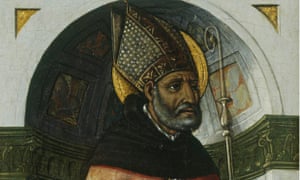
Inventing the Individual: the Origins of Western Liberalism by Larry Siedentop – review
A remarkable book that will change the way you think about our concept of ourselves

Want to celebrate a special anniversary? Here’s one, from precisely 700 years ago. It’s a decree from Louis X of France – also known as Louis le Hutin, or Louis the Stubborn:
“As according to the law of nature each must be born free ... many of our common people have fallen into servitude and diverse conditions which very much displease us; we, considering that our kingdom is called ... the kingdom of the Franks [free men], and wishing that the fact should be truly accordant with the name ... have ordered and order that ... such servitudes be brought back to freedom ...”You get the gist: serfdom was abolished. True, you had to buy your freedom, so this was also a revenue-gathering exercise, as well as a way of the monarchy getting the jump on feudal lords; but the principle is sound.
It comes towards the end of this remarkable book, which made me rethink a great deal. Like many, I had assumed that notions of individual liberty didn’t come into play until the latter end of the Enlightenment. It was something to do with Voltaire, perhaps, or the second sentenceof the American Declaration of Independence. If the Church had anything to do with individuality, it was as a brake on it, or a countermeasure. We were all just anonymous units before the power of God.
Siedentop demonstrates that the picture is much more complex. In fact, he claims, it is Christianity we have to thank, and particularly the Christianity that was being formed in the dark and early medieval ages, for our concept of ourselves as free agents. He starts in ancient Greece and Rome: there, the faculty of reason was only to be found in the ruling elite, which, in effect, meant men of a certain class in a city state. If you were a woman, merchant, or slave, all you could really use your brains for were, respectively, gossip, mercantile calculation, and unthinking obedience. (A glance at newsagents’ shelves these days may make you suspect that civilisation has gone retrograde in these respects, but let us pass on that for the moment.) Even philosophers, who had no direct alleçgiance to a specific place, were for a while suspect. However, seeds were sown, and things got interesting when Greek- and Latin-speaking urban dwellers around the Mediterranean started encountering the Jewish diaspora:
“Just what was it that, rather suddenly, made Jewish beliefs so interesting? It was partly a matter of imagery. The image of a single, remote and inscrutable God dispensing his laws to a whole people corresponded to the experience of peoples who were being subjugated to the Roman imperium.”
This is the beginning of a thoughtful jaunt through several centuries of developing theological and legal thinking. The stars are Augustine, Duns Scotusand William of Ockham: he of the famous Razor, the injunction that “it is futile to work with more entities when it is possible to work with fewer”. (Here, the entities concerned were demons, but the principle “a plurality must not be asserted without necessity” came to be quickly understood as very much more widely applicable.)
This is not a book to take on a beach holiday; it is chewy, involved stuff, and if at times it looks as though Siedentop is repeating himself, you may well be grateful, as I was, because you might not have got it first time round. I have never hitherto had to think about, for example, medieval corporation law and its relation to ecclesiastical authority. But the book is, once you get past the superficial difficulties, not too hard to grasp, and its basic principle – “that the Christian conception of God provided the foundation for what became an unprecedented form of human society” – is, when you think about it, mind-bending.
No comments:
Post a Comment